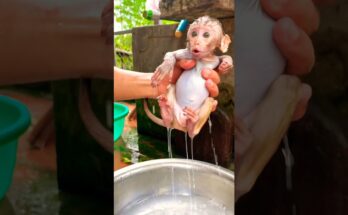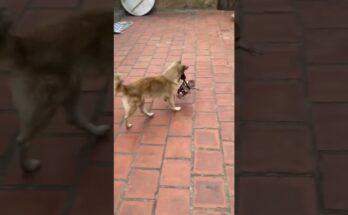Deep in the heart of the Amazon rainforest, where lush greenery hides both wonders and dangers, a heartbreaking discovery led to an inspiring tale of resilience and compassion. Rhoda, a small capuchin monkey, was found alone and paralyzed near a remote logging trail—abandoned, vulnerable, and barely clinging to life. Her survival seemed unlikely. But thanks to a daring and compassionate rescue effort by a dedicated team of conservationists, her story is now one of hope, not just tragedy.
Rhoda’s ordeal began when illegal logging activity disturbed her troop’s habitat. Witnesses believe she may have fallen from the canopy during a frantic escape or been injured by a trap meant for other animals. When she was eventually spotted by a local villager, she was unable to move her hind legs and had clear signs of trauma. The villager alerted a nearby wildlife rescue organization, and within hours, a team was mobilized.
Getting to Rhoda wasn’t easy. The rainforest terrain is notoriously treacherous—dense undergrowth, unpredictable weather, and the constant threat of wildlife make any rescue operation difficult. But the team, made up of biologists, veterinarians, and volunteers, pushed forward with urgency. After a two-day trek, they reached the spot where Rhoda lay—silent, motionless, and frightened. She was dehydrated, malnourished, and clearly in pain. But there was a flicker of awareness in her eyes. She was still fighting.

Carefully, the team lifted her into a transport crate lined with soft fabric and carried her back through the jungle. Every bump and stumble could have worsened her condition, but the rescuers moved with extraordinary care. Once at the rehabilitation center, veterinarians confirmed the worst: Rhoda had suffered spinal trauma and was partially paralyzed. The prognosis was uncertain, but the team refused to give up.
Over the following weeks, Rhoda received around-the-clock care. She was fed by hand, bathed gently, and given physical therapy. Her caretakers sang to her and offered toys to stimulate her mind. Slowly, she began to respond. Though she would never walk like she once did, she started using her arms more confidently, learned to climb using only her upper body, and even formed bonds with other rescued monkeys.
Her spirit amazed everyone. Despite her injury, Rhoda seemed determined to live. She began vocalizing again—soft chirps and coos when her favorite caretakers approached. She even showed signs of playfulness, tugging on strings or tossing fruit peels with surprising strength.
Rhoda’s story is not just a tale of individual resilience—it’s a reminder of what’s at stake in the fight to protect wildlife. Her injury may have been caused by human activity, but her survival was made possible by human compassion. Today, she lives at the sanctuary permanently, a symbol of both the fragility and strength of life in the Amazon.
Her journey, from paralyzed and abandoned to hopeful and loved, shows that even in the most remote corners of the world, hope can flourish—especially when people are brave enough to care. Would you like help finding footage or images of similar primate rescues?

